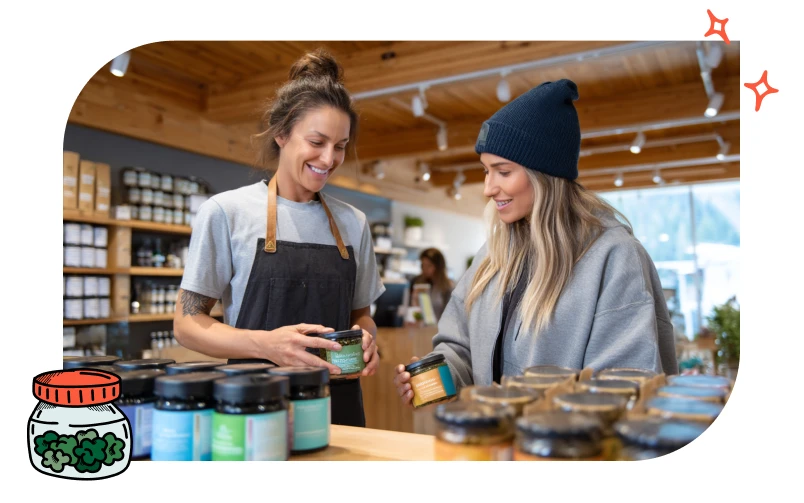What Is the Role of a Budtender? Skills and Daily Tasks Explained
.png)

As the legal cannabis industry continues to grow like a well-fed sativa, one role stands out as the backbone of every successful dispensary: the budtender. These front-facing professionals aren’t just selling cannabis — they’re shaping the customer experience, ensuring compliance, and driving brand loyalty.
So what is a budtender, really? And why is their role so vital to the cannabis industry?
In this guide, we’re breaking down everything you need to know about the role of a budtender — from daily responsibilities and career growth, to required certifications and how dispensaries can better support their budtending team.
What Is a Budtender?
A budtender is the customer service specialist in a cannabis dispensary. They help customers choose the right products, offer education on usage and effects, and ensure all transactions follow local laws. Part product expert, part compliance pro, and part retail hero — they’re the face of the cannabis experience.
What Does a Budtender Do Day-to-Day?
At its core, the budtender’s job revolves around customer interaction and product knowledge. They greet visitors, ask the right questions to gauge experience levels and needs, and suggest cannabis products tailored to mood, medical needs, or recreational goals. A great budtender makes buying cannabis feel comfortable and informative, not intimidating.
Key responsibilities include:
- Recommending products based on desired effects or ailments
- Explaining dosage, strain differences, and consumption methods
- Checking IDs and ensuring age and purchase limit compliance
- Restocking shelves, managing displays, and updating product menus
- Handling POS systems and secure cash transactions
- Staying up-to-date on new products and regulations
Budtenders are also responsible for maintaining a safe, clean, and welcoming environment, which is especially important in highly regulated industries like cannabis.

What Certifications or Training Does a Budtender Need?
The short answer? It depends on your location.
Some U.S. states and Canadian provinces require formal certifications or permits to work in a cannabis dispensary. These often include:
- Responsible Vendor Training
- Cannabis Worker Permits (like in Colorado or Oregon)
- Background checks and age verification (typically 21+ in the U.S., 19+ in Canada)
But even where certification isn’t legally required, ongoing cannabis education is strongly recommended. Top dispensaries often provide or require training in:
- Terpene and cannabinoid science
- Compliance and safety protocols
- Sales techniques and customer service
- POS and inventory software
Certifications from programs like Cannabis Training University (CTU) or Green Flower can also help new budtenders stand out in competitive job markets.
What Skills Make a Great Budtender?
While cannabis knowledge is a must, soft skills are what really set top-tier budtenders apart. The best in the business know how to create trust, ease anxiety, and deliver a great customer experience.
Core skills include:
- Empathy and active listening: Not every customer knows what they need, especially first-timers.
- Product fluency: Understanding strains, potencies, and delivery methods is essential.
- Clear communication: Explaining effects and dosages in plain language is a daily task.
- Compliance awareness: Knowing what not to say is just as important as what to say.
Add in some charisma and a genuine passion for cannabis culture, and you’ve got a winning budtender profile.
What Does a Typical Shift Look Like for a Budtender?
Each day as a budtender may look a little different, but let’s run through what a typical day may look like. A budtender clocks in at 9:00 a.m., gets the product cases clean and stocked, reviews the day’s menu changes, and checks in on any updates from management — new promos, updated laws, or tech changes.
As customers start rolling in, they shift into service mode:
- Scanning IDs and confirming legal eligibility
- Asking about the customer’s preferences and needs
- Recommending products (with a sprinkle of cannabis wisdom)
- Processing sales and ensuring the packaging matches state regulations
In between rushes, there’s inventory tracking, restocking, sanitation, and sometimes even content creation for social media or loyalty programs.
Most budtenders are on their feet, juggling compliance and customer satisfaction with ease. It’s retail with a high-stakes twist.

Is Budtending a Long-Term Career?
Historically seen as an entry-level role, budtending is increasingly becoming a stepping stone to a long-term career in cannabis. With dedication and ongoing education, many budtenders move into roles such as:
- Lead Budtender or Shift Supervisor
- Inventory or Compliance Manager
- Brand Representative
- Store Manager
- Buyer or Product Curator
- Marketing or Event Coordinator
And with the cannabis industry expected to generate over $45 billion in U.S. sales by 2025, the opportunities for advancement and specialization are growing rapidly.
Are Budtender Jobs in High Demand?
Yes — and it’s not slowing down.
According to recent industry reports, the legal cannabis sector is one of the fastest-growing job markets in North America. With the rise of dispensaries in newly legal states, budtender roles are increasing to meet demand.
In 2023, the U.S. legal cannabis workforce grew by 5.4%, adding 23,000 new jobs, bringing the total to over 440,000 full-time positions. And as consumer expectations grow, so does the need for skilled, reliable budtenders who can deliver standout service.
How Much Do Budtenders Get Paid?
Budtender wages vary by location, dispensary size, and experience level.
In the U.S., average hourly pay ranges from $14 to $22, with higher rates in competitive markets like California, Massachusetts, and Colorado. In Canada, budtenders typically earn between $16 and $22 CAD per hour.
Some dispensaries offer commission or tips, where allowed by law, and benefits like healthcare or employee discounts. As with many retail positions, night and weekend shifts can lead to higher earning potential.
Budtender vs. Sales Associate: What’s the Difference?
At first glance, a budtender might seem just like any other sales associate in retail — but there are some key differences that make this role uniquely complex and critical.
While both roles involve helping customers and processing transactions, budtenders must also:
- Navigate strict cannabis regulations
- Understand product composition like THC/CBD levels, terpene profiles, and effects
- Provide medical and recreational guidance tailored to individual needs
- Stay current with ever-evolving compliance laws
- Serve as trusted advisors in a highly stigmatized and regulated industry
In short, a budtender is a hybrid of a sales associate and cannabis educator. They require a much deeper level of knowledge and regulatory awareness than traditional retail staff.
As cannabis continues to gain legitimacy and competition intensifies, dispensaries that treat their budtenders as more than basic sales clerks — and invest in their training and well-being — will see the biggest returns.

Do Budtenders Make More Money Than Retail Sales Associates?
In many cases, yes — but it depends on location, dispensary policies, and tipping laws.
While the base pay for budtenders often aligns with general retail associates (typically between $14–$22/hour in the U.S.), many dispensaries allow tipping, which can significantly boost take-home pay. In cannabis-friendly cities where tipping is common, skilled budtenders can earn substantially more than traditional retail workers.
Additionally, as the cannabis market becomes more competitive, some dispensaries offer performance bonuses, product commissions, and health benefits that aren’t as common in standard retail jobs. Factor in career growth opportunities, and budtending can become a more financially rewarding path than general sales roles.
That said, the job also comes with more responsibility, compliance training, and legal risk, which is why compensation often reflects the elevated expectations.
How Do Budtenders Impact the Dispensary’s Success?
A great budtender can make or break a cannabis business. Why? Because they're the face of the brand.
Their product knowledge drives upsells. Their customer service builds loyalty. Their attention to compliance avoids costly fines. Simply put: happy, informed budtenders lead to happy, returning customers.
They’re also crucial for gathering informal feedback — what products customers love, what’s missing, and what’s trending. That insight helps owners and managers make smarter inventory and marketing decisions.
How Can Dispensaries Support and Retain Budtenders?
Budtender turnover is real — and expensive. So how can dispensary owners keep their team happy and performing at their peak?
Start with scheduling and payroll. Using a dispensary-friendly platform like KayaPush helps managers:
- Automate scheduling based on staff availability and demand
- Track sales performance and labor costs
- Run compliant payroll with ease
- Centralize communication for shift swaps and updates
Combine that with training opportunities, recognition programs, and a supportive culture, and you’ll turn high-performing budtenders into long-term brand ambassadors.
Final Hit: Budtenders Are the Heart of Every Dispensary
Budtenders are more than cannabis clerks — they’re educators, advisors, and essential cogs in the cannabis retail engine. Whether they're guiding a first-time customer through the product menu or upselling a loyal shopper to try a new strain, their impact touches every corner of the business.
Want to empower your budtenders to shine?
Start by making their jobs smoother, smarter, and more satisfying with KayaPush’s all-in-one dispensary workforce management system. Automate the grind, and let your team focus on what they do best — elevating every customer interaction.


